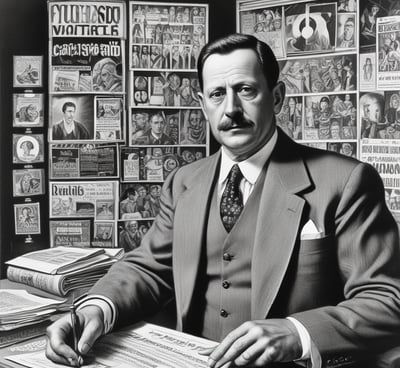Propaganda 1928
1928 Bernays The conscious and intelligent manipulation of the organized habits and opinions of the masses is an important element in democratic society. Those who manipulate this unseen mechanism of society constitute an invisible government which is the true ruling power of our country. We are governed, our minds are molded, our tastes formed, our ideas suggested, largely by men we have never heard of. This is a logical result of the way in which our democratic society is organized. Vast numbers of human beings must cooperate in this manner if they are to live together as a smoothly functioning society. ... In almost every act of our daily lives, whether in the sphere of politics or business, in our social conduct or our ethical thinking, we are dominated by the relatively small number of persons who understand the mental processes and social patterns of the masses. It is they who pull the wires which control the public mind. Only through the active energy of the intelligent few can the public at large become aware of and act upon new ideas. Small groups of persons can, and do, make the rest of us think what they please about a given subject. But there are usually proponents and opponents of every propaganda, both of whom are equally eager to convince the majority. Business must express itself and its entire corporate existence so that the public will understand and accept it. It must dramatize its personality and interpret its objectives in every particular in which it comes into contact with the community (or the nation) of which it is a part. I am aware that the word "propaganda" carries to many minds an unpleasant connotation. Yet whether, in any instance, propaganda is good or bad depends upon the merit of the cause urged, and the correctness of the information published. There are invisible rulers who control the destinies of millions. It is not generally realized to what extent the words and actions of our most influential public men are dictated by shrewd persons operating behind the scenes. #1 Determine feasibility. Is this idea feasible to the public at this time? Or is it a waste of time due to external factors? #2 Analyze his public. He studies the demographics which must be reached, and the leaders through whom he may approach these demographics. Social groups, economic groups, geographical groups, age groups, doctrinal groups, language groups, cultural groups, all these represent the divisions through which, on behalf of his client, he may talk to the public #3 Analyze yourself (or your client, your company). what are all the ways/practices/procedures currently by in which you come into contact with the public? This point is most important in successful propaganda work. The leaders who lend their authority to any propaganda campaign will do so only if it can be made to touch their own interests. There must be a disinterested aspect of the propagandist's activities. In other words, it is one of the functions of the public relations counsel to discover at what points his client's interests coincide with those of other individuals or groups. The old salesmanship was "Please buy a piano" Now we make the public want to say "Please sell me a piano" Such persons typify in the public mind the type of ruler associated with the phrase invisible government. But we do not often stop to think that there are dictators in other fields whose influence is just as decisive as that of the politicians I have mentioned. An Irene Castle can establish the fashion of short hair which dominates nine-tenths of the women who make any pretense to being fashionable. Paris fashion leaders set the mode of the short skirt, for wearing which, twenty years ago, any woman would simply have been arrested and thrown into jail by the New York police, and the entire women's clothing industry, capitalized at hundreds of millions of dollars, must be reorganized to conform to their dictum. It takes account not merely of the individual, nor even of the mass mind alone, but also and especially of the anatomy of society, with its interlocking group formations and loyalties. It sees the individual not only as a cell in the social organism but as a cell organized into the social unit. Touch a nerve at a sensitive spot and you get an automatic response from certain specific members of the organism. A desire for a specific reform, however widespread, cannot be translated into action until it is made articulate, and until it has exerted sufficient pressure upon the proper law-making bodies. Millions of housewives may feel that manufactured foods deleterious to health should be prohibited. But there is little chance that their individual desires will be translated into effective legal form unless their half-expressed demand can be organized, made vocal, and concentrated upon the state legislature or upon the Federal Congress in some mode which will produce the results they desire. Whether they realize it or not, they call upon propaganda to organize and effectuate their demand. Women are just as subject to the commands of invisible government as are men. A silk manufacturer, seeking a new market for its product, suggested to a large manufacturer of shoes that women's shoes should be covered with silk to match their dresses. The idea was adopted and systematically propagandized. A popular actress was persuaded to wear the shoes. The fashion spread. The shoe firm was ready with the supply to meet the created demand. And the silk company was ready with the silk for more shoes. The man who injected this idea into the shoe industry was ruling women in one department of their social lives. Different men rule us in the various departments of our lives. There may be one power behind the throne in politics, another in the manipulation of the Federal discount rate, and still another in the dictation of next season's dances. The New Propagandists would work through certain group leaders on Tuesday for one purpose, and through an entirely different set on Wednesday for another. The idea of invisible government is relative. There may be a handful of men who control the educational methods of the great majority of our schools. Yet from another standpoint, every parent is a group leader with authority over his or her children. PR is a 20th-century phenomenon, and Bernays--widely eulogized as the "father of public relations" at the time of his death in 1995--played a major role in defining the industry's philosophy and methods.Bernays is held in high regard by some and thoroughly despised by others even today, and was even named as one of the 1,000 most influential people of all time. In addition to his uncle Freud, Bernays also used the theories of Ivan Pavlov. believe that competition in the future will not be only an advertising competition between individual products or between big associations, but that it will in addition be a competition of propaganda No serious sociologist any longer believes that the voice of the people expresses any divine or specially wise and lofty idea. The voice of the people expresses the mind of the people, and that mind is made up for it by the group leaders in whom it believes and by those persons who understand the manipulation of public opinion. It is composed of inherited prejudices and symbols and cliches and verbal formulas supplied to them by the leaders. Fortunately, the sincere and gifted politician is able, by the instrument of propaganda, to mold and form the will of the people. "It matters not how much capital you may have, how fair the rates may be, how favorable the conditions of service, if you haven't behind you a sympathetic public opinion, you are bound to fail." "Once you have the good will of the general public, you can go ahead in the work of constructive expansion. Too often many try to discount this vague and intangible element. That way lies destruction." "Once you build a connection with the audience and they love you and you love them, you can take them anywhere. That's the true freedom of stand-up comedy" Public Opinion affects representative government. Government can regulate laws like anti-trust and Bank-Bailout. Public -> Government -> Business Business --> Media --> Public --> purchases, images, desires Government --> Media --> Public --> patriotism, war support, support of one rep over the other, break down unfair competitive exaggerated and overemphatic advertising by reaching the public with the truth through other channels than advertising. Where two competitors in a field are fighting each other with this type of advertising, they are undermining that particular industry to a point where the public may lose confidence in the whole industry. The only way to combat such unethical methods, is for ethical members of the industry to use the weapon of propaganda in order to bring out basic truths
3/16/20251 min read


